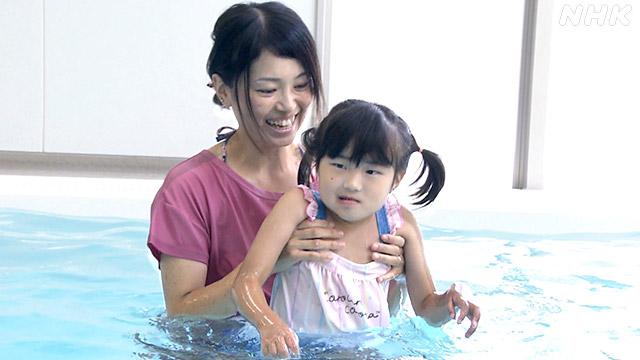Childhood cancer is cured, but ... A new struggle for the family Sep 9 at 21:19
Childhood cancer was once said to be an "incurable disease," but with the advancement of medical care, it is said that about 8% of patients can now be cured, depending on the type.
On the other hand, new problems have emerged as the cure rate has increased.
Even if childhood cancer is cured, cases of "disability" and "complication" have been reported since then.
(Utsunomiya Broadcasting Station Reporter Kazuaki Hirama)
Girls diagnosed with "childhood cancer"
Akari Otsuka, a six-year-old resident of Moka City, Tochigi Prefecture, was diagnosed with childhood cancer when she was eight months old.
Worried about their daughter's inability to turn over, her parents had her undergo a detailed examination and found a malignant tumor and cancer in her brain.
Her mother, Asuka Otsuka
: "I wondered why it was my child, and I sometimes blamed myself for not growing up in my womb because she was originally a premature baby and was born small."
"The probability of being saved is 50%..."
Tsuki-chan had to have her tumor removed by surgery.
At that time, the doctor told me the harsh reality that there was a 50% chance of success and survival.
I want to celebrate my first birthday.
The date of the surgery was decided right after Tsuki-chan's birthday.
All cancers are removed
The surgery started in the morning and was completed in the afternoon, but in the evening his condition suddenly changed. A second emergency operation was performed that evening.
It all ended around the time the date changed.
Her parents were shown images of Tsuki-chan's brain by doctors and told that all the tumors had been removed.
The beginning of a new struggle
Tsuki-chan survived treatment for childhood cancer.
But for the family, this became the beginning of a new struggle.
After the surgery, I began to see various obstacles.
One of them is developmental delay.
Tsuki-chan is now six years old and still can't speak. Assistance with meals is also required. You can have a spoon or fork, but you can't eat alone.
There was also a delay in the development of motor functions.
It wasn't until I was five years old that I learned to walk.
Tsuki-chan's doctor explained the cause of these disorders, such as the burden on the heart due to the effects of anticancer drugs and the possibility that it was related to chromosomal abnormalities that caused cancer, but it is still not known for certain.
When his parents asked him about his prospects for growth, the doctor simply replied, "I don't know."
Her mother, Asuka Otsuka
: "Right now, I really need help wearing diapers and eating, so I'm worried about how far I can grow when I grow up, and how far my parents will let go of me."
Post-treatment challenges "Late complications"
Disorders seen after treatment for childhood cancer, such as Tsuki-chan, are called "late complications" and are now being reported nationwide.
And in Japan, this response is still not enough.
[Main "late complications"]
・Growth and development abnormalities (including endocrine abnormalities)
Height growth disorder, amenorrhea, infertility, obesity, thinness, diabetes
/ central nervous system abnormality
Leukoencephalopathy, epilepsy, learning disability
/ other organ abnormalities
Cardiac function abnormality, respiratory function abnormality, liver dysfunction, hepatitis, Weakened
immune function, secondary tumors (secondary cancers), leukemia, brain tumors, thyroid cancers
, and other cancers
(from the website of the Ministry of Health, Labour and Welfare)
There is concern that the treatment of childhood cancer may affect subsequent growth because it involves irradiation at an early age of physical development and taking strong drugs such as anticancer drugs.
According to specialists, in Japan, priority has been given only to treating the cancer itself, but now research on late complications has begun.
Investigation of "late complications" that have begun to move
A group led by Dr. Shinsuke Kataoka of Nagoya University Hospital embarked on a large-scale survey of approximately 2,3000 people nationwide who had overcome childhood cancer like Tsuki-chan.
We would like to investigate what kind of "disorders" and "complications" are seen in patients who have completed cancer treatment, create a database, and use it as a reference when doctors nationwide formulate treatment policies for pediatric cancer in the future.
Dr. Shinsuke Kataoka, Department
of Pediatrics, Nagoya University Hospital: "In Japan, the number of people who are cured of childhood cancer has increased, but as such people grow into adults, there is still little data on what kind of organs and what kind of complications occur.
Believing in Tsuki-chan's growth
Tsuki-chan is now working with her mother, Asuka, five days a week on rehabilitation by listening to songs and moving her limbs in the pool.
I want to nurture the small lives saved from childhood cancer, even if it takes time. This is Asuka's wish.
Her mother, Asuka Otsuka,
said, "In the future, when my daughter grows up, I would like to go shopping with her and have a girls' talk.
Utsunomiya Broadcasting Station reporter
Kazuaki
Hirama Joined the Utsunomiya
station in Heisei 8, where he was involved in covering the new corona and medical problems, and produced programs that face life.

